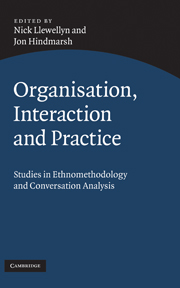Book contents
- Frontmatter
- Contents
- List of contributors
- Preface
- Part I Orientations
- Part II Studies
- 3 A kind of governance: rules, time and psychology in organisations
- 4 On the reflexivity between setting and practice: the ‘recruitment interview’
- 5 The situated production of stories
- 6 Orders of bidding: organising participation in auctions of fine art and antiques
- 7 Some major organisational consequences of some ‘minor’, organised conduct: evidence from a video analysis of pre-verbal service encounters in a showroom retail store
- 8 The work of the work order: document practice in face-to-face service encounters
- 9 The interactional accomplishment of a strategic plan
- 10 Peripherality, participation and communities of practice: examining the patient in dental training
- List of references
- Index
7 - Some major organisational consequences of some ‘minor’, organised conduct: evidence from a video analysis of pre-verbal service encounters in a showroom retail store
Published online by Cambridge University Press: 20 May 2010
- Frontmatter
- Contents
- List of contributors
- Preface
- Part I Orientations
- Part II Studies
- 3 A kind of governance: rules, time and psychology in organisations
- 4 On the reflexivity between setting and practice: the ‘recruitment interview’
- 5 The situated production of stories
- 6 Orders of bidding: organising participation in auctions of fine art and antiques
- 7 Some major organisational consequences of some ‘minor’, organised conduct: evidence from a video analysis of pre-verbal service encounters in a showroom retail store
- 8 The work of the work order: document practice in face-to-face service encounters
- 9 The interactional accomplishment of a strategic plan
- 10 Peripherality, participation and communities of practice: examining the patient in dental training
- List of references
- Index
Summary
Introduction
This chapter reports the results of an analysis of the ways shoppers regularly occasioned (or attempted to occasion) or avoided (or attempted to avoid) verbal encounters with salespeople in a retail store. These everyday events are of vital importance for retail researchers and practitioners as they not only precede and influence but also make possible the various economic outcomes (notably product sales) that comprise the very raison d'être of the type of retailers we examine. More specifically, our study reveals that the different kinds of pre-verbal encounter conduct the shoppers engaged in to accomplish these actions are underpinned with and managed through a complex, integrated framework of socially organised communicative practices that, along with the interactional ‘rules’, expectations, obligations and other situational factors which also inform these actions, comprise a highly economically consequential, underexplored and commonly misunderstood dimension of the retail shopping and selling process.
Our work builds on a growing body of research illustrating the fundamentally social and interactional basis of buying, selling and consumer conduct in real-life settings as diverse as street markets and TV infomercials (Pinch and Clark 1986; C. Clark and Pinch 1988, 1995a, 1995b), auctions and mock auctions (C. Clark and Pinch 1992; Heath and Luff 2007b), street entertainment and street vending (Mulkay and Howe 1994; C. Clark and Pinch 1995a; Llewellyn and Burrow 2008), telephone sales (C. Clark, Drew and Pinch 1994; Mazeland 2004), business-to-business selling (Mulkay, Clark and Pinch 1993; C. Clark, Drew and Pinch 2003) and retail and service encounters (Garfinkel and Livingston 2003; B. Brown 2004; C. Clark 2004).
- Type
- Chapter
- Information
- Organisation, Interaction and PracticeStudies of Ethnomethodology and Conversation Analysis, pp. 140 - 171Publisher: Cambridge University PressPrint publication year: 2010
- 24
- Cited by

